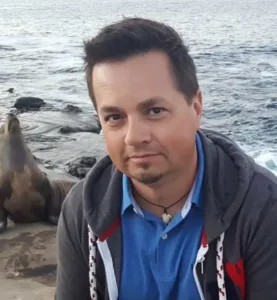Croatia
Study Abroad in Croatia
Explore Mediterranean islands and wind through the Adriatic archipelagos in search of whales, dolphins, and sea turtles. Work alongside marine conservation professionals as they study population ecology, community behavior, and practice rescue and rehabilitation actions on these animals. The Center for the Conservation of Marine Megafauna program takes place in the Croatian archipelagos of the Eastern Adriatic coast. Consisting of 1,244 islands, islets, and reefs, the Croatian coast is one of the most beautiful in the Mediterranean. The Adriatic Sea is a hotspot for biodiversity, and one of the regions of the Mediterranean most affected by climate change. Course fieldwork focuses on issues such as spatial and population ecology of marine megafauna, human dimensions of conservation, and veterinary sciences.
Programs
Sea Turtles and Marine Mammals of the Adriatic
See Program Costs
Program Costs
- Tuition
- Room & Board
- Total
Where You'll be Living
The SFS Center for the Conservation of Marine Megafauna is located on the northern most archipelago of the Croatian islands on the outskirts of the village of Veli Lošinj. Veli Lošinj has restaurants, artisan shops, ATMs, a market, and a busy summer tourist season. The Center is situated in an old garden forest with a view of the Kvarnerić archipelago islands and Northern Velebit Nature Park. Only 4 km away is Mali Lošinj, the largest Croatian island city, with multiple shops, banks, and a hospital. The accommodation is dorm-living with heating, four-person rooms with bathroom.
- Classroom with library
- Student lounge
- Open-air terrace
- Food provided onsite
- Running and cycling routes along the coast and through the old garden forest
- Basketball court and outdoor gym
PRogram Costs
Study abroad is an investment in yourself – you’ll return home with new experiences, skills, knowledge, and friendships that will stay with you for the rest of your life. SFS program costs cover a variety of expenses, including:
- Pre-program advising and on-site orientation
- Tuition and research fees
- Housing at the field station and on excursions
- Daily meals and snacks
- Airport transfers (for arrival/departure)
- Field excursions and cultural activities
- Student success and wellness team on site
- 24/7 mental health and well-being support
- Emergency evacuation and repatriation insurance
- Official transcript processing
Financial Aid
We know cost can be one of the biggest barriers to studying abroad. At SFS, we’re committed to making our programs accessible to students which is why we award a generous amount in need-based financial aid each year. Our Admissions Team has worked with thousands of students and are here to answer your questions about the SFS aid process, aid available through your home school, and funding from external sources.
SFS Financial Aid: Need-based aid packages typically consist of a combination of scholarships, grants, and zero- and low-interest loans. SFS matches Federal Pell Grant funding for students applying to an SFS semester program.
Home School Aid: Be sure to ask your home school study abroad office or financial aid office what financial aid resources might be available to support your study abroad experience.
External Funding Opportunities: Organizations such as the Fund for Education Abroad or the Gilman International Scholarship Program award scholarships to students going abroad. These can be a great opportunity to reduce the cost of your program even more.
Research
The SFS Center for the Conservation of Marine Megafauna is a partnership between SFS and the Blue World Institute of Marine Research and Conservation (BWI), a non-governmental organization working on the Adriatic since 2000. Research is primarily boat-based and focuses on cetaceans and sea turtles both of which are important indicator species for the health of marine environments and the impacts of climate change. Faculty work with government partners, community members, NGOs, and other key stakeholders. Our faculty and students seek to analyze and develop strategies to understand the status of target species, identify threats, and support marine and coastal conservation initiatives in the Adriatic Sea.
Our research focuses primarily on the following themes:
- Cetacean and sea turtle ecology
- Biodiversity conservation
- Marine spatial planning and regional conservation
- Systematic conservation planning and decision making
- Cetaceans and sea turtles rescue procedures
- Sea turtle rehabilitation and husbandry practices.
- Veterinary investigations and diagnostics
Community
Formally established in 2000, the BWI is an active part of the local community. We have built long-term, collaborative relationships in the community, developed our research plans based on the environmental issues that affect the surrounding ecosystems and regional sea.
In 2003, the BWI constructed the Lošinj marine education center in the harbor of Veli Lošinj which quickly became a focal point for education and community involvement. In 2013, we opened our turtle rescue center in Sunny Bay, Mali Lošinj, expanding our research to include veterinary sciences.
At the end of each semester program, we host a Community Research Night where students present their research findings to various members of the community, local NGOs, and the Croatian government.
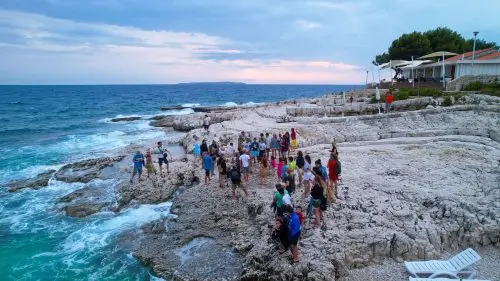
Meet the Croatia Team
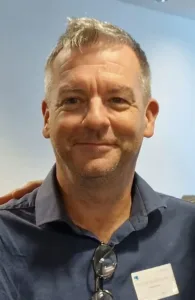
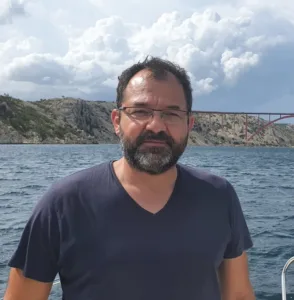
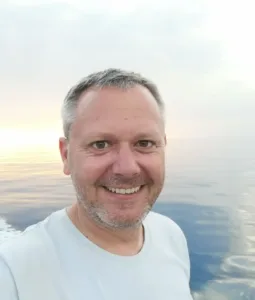
Grgur Pleslić, PhD
